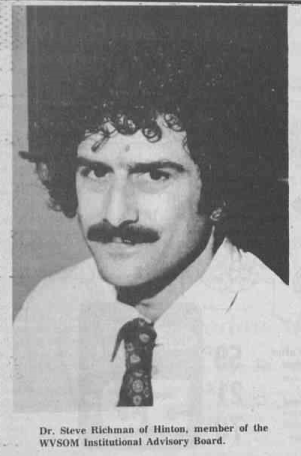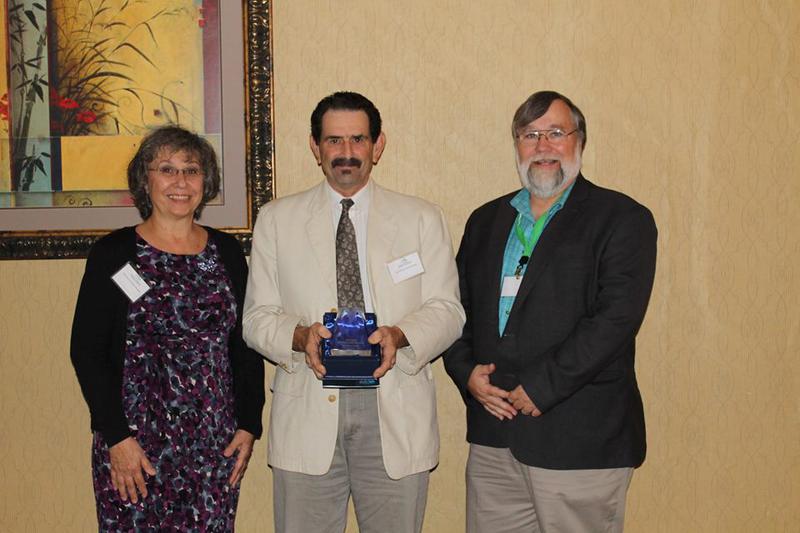Dr. Steve Richman, Rural Health Provider of the Year
by Cate Murway
“I have contacted Steve, and he agreed to allow me to publicize his accomplishments.
It seems to me that this is a terrific human interest story of a Bristol Boy who has done well and is passing on his father's generosity.”
Alan J. Vogenberg, BSPharm, RPh, FASCP, treasurer of the Bristol Jewish Center
Steven I. Richman, DO ‘2014 Rural Health Provider of the Year’, the valued and highly trained osteopathic physician, remains the 'hidden heart' of primary care in rural West Virginia. Rural towns are dependent upon these health care providers to ensure the continuing health and sustainability of their local communities.
Steve was attracted by the diversity, challenge and passion of Hinton, WV. The “people are great. The area is great. The people are happy and it’s not over populated”; so to Dr. Richman, “it feels the way it did” when he was a youth, growing up in historic Bristol on the Delaware.
The philosophy of osteopathic medicine originated from the teachings of Virginian Andrew Taylor Still [1828-1917] over 100 years ago and is based on the beliefs that, given the optimum conditions, the human body has the amazing ability to heal, that the structure of the human body is directly related to the function, and that the health of the individual is related to the body, mind, and spirit. Osteopathic values include medicine focused on the patient rather than the disease and the importance of human touch in diagnosing and treating the patient.
Enter Steven Ira Richman, DO, the son of Charles and Elsie Beatrice [Sobel] Richman, the proprietors of Richman's, the ideal place for linens, window treatments and various dry goods. Their middle of the street shop with the big windows was located on Mill Street in 1942. Steve’s father, Charlie was very active in several community organizations, as well as one of the co-founders of the Bristol Cultural & Historical Foundation [BCHF], along with his brother-in-law, Dr. Jules Sobel.
The Richmans were philanthropists, giving most generously of their time and monies to the BRT, Bristol Lions [Charlie was President], the Delaware Philharmonic Orchestra Association, and a major financial contribution, $50,000, for the computer lab in Elsie Richman’s name at Bristol High School.
A carved bench and wooden chairs, donated by the Richman family, grace the BJC back study rooms.
The Mill Street Business Association, located on the principal commercial street in Bristol, started after WWII in the 1950s. When Harriman was included in the 1980s, it became known as the Bristol Borough Business Association. Charlie Richman was the President and it was he and Leon Plavin, a fellow businessman and a community and civil-rights activist, who set out to visit neighboring business districts to learn why they were successful.
The Richman’s son, Steven who graduated from Delhaas H.S. in ’63, “wanted to give back to the community”.
Dr. Richman’s middle name is Ira, in honor of his maternal grandfather. His parents grew up in Philadelphia and they started their family and their business in the Borough. Steve was born in their apartment on the 3rd floor of the store on 313-315 Mill Street, across from Brosbe’s Drugs and Ballow’s Shoes.
After school and during the summer months, from about the age of 6 or 7, Steve worked in the two floor store. His dad’s part included televisions, refrigerators, air conditioners and wall paper. His mom’s section was stocked with draperies, linens, curtains and domestics. He helped making deliveries in his dad’s “full size little truck”. He does remember that loading got so much easier when they got a lift for the truck. His Dad ran the store until about 1978.
Senator Joseph R. Grundy was driven to their shop in a chauffeured vehicle. Steve recalls, “He was fairly tall and thin, wearing a nice suit.” He remembers visiting the Grundy’s “very stately” Walnut Grove home in Bristol Township.
One of the fond memories of his youth includes his art teacher, the late celebrated artist/craftsman, Joseph E. Pavone. He can remember Mill Street parades and enjoying the Delaware River in his back yard. He fished almost every day, catching “perch, sunfish, catfish, eels and carp”. He ate what he caught, “the perch was ok.” He participated in the spring “shad run” in the 55 degree weather. He and his buddies waded into the river in Yardley, casting the “golden darts”, artificial lures.
He and his classmates were “tight knit” and he feels that owning a store on Mill Street made it “easier to cut through social barriers”. His friend, Dennis Levinson’s father, Sam, owned “Sam’s Cut Rate Drug Store”.
His dad purchased a solid mahogany pool table in 1942 that was made in 1875 in Philadelphia. He still owns that table. It was a “back in the day pastime then” and he played many a game with his father’s brother, Uncle Aaron.
Early summertime included the Delaware Valley Hospital Lawn fetes where he ran the hot dog booth. The festival was sponsored by the Hospital auxiliary and it featured a giant Ferris wheel, merry-go-round, fire engine and pony rides, and various games of skill.
“Trick or Treating” was fun throughout Landreth Manor.
Dr. Richman entered as a pre-med student at U of PA and graduated with a degree in Anthropology. Steve was a member of the undefeated frosh fencing team. He earned his letter in the martial art of fighting with blades. “Hey, I got a free sweater”, deep blue with red letters. They wore white protective gear in competition. Track was his sport in junior high when he ran “the 440 [called it the ‘chariot race’] and mile relays”.
He majored in general anthropology and continued physical anthropology in grad school, culminating with taking Comprehensives for his Masters.
Steve started his own business, dubbed ‘Lagniappe’, manufacturing and designing ladies’ sportswear dresses in Philadelphia. “People were artsy in West Philadelphia, in Powelton Village.”
His mom’s close friend’s husband, Mr. Miller made the patterns for him to send to Delhi, India and he had a “good connection for Indian silk”. He astutely learned the trade customs, and sold his finished merchandise to large retail stores [he knew a buyer at Gimbel’s] and he marketed to the local boutiques.
He left Philly for good in 1970, moving to rural West Virginia. He originally searched through NJ and DE but landed a deal for 400 acres for $25,000. “The people and taxes were great” and Hinton is a breathtaking mountain community. 30 acres are designated for an alfalfa hayfield and the rest is timbered. It is a federal government authorized tree farm of poplar, oak, maple, birch, and cherry trees that are cut every 20-25 years. They harvest trees with a least a 25” diameter. 1/8 acre grids are checked and they mark the trees that should be cut to make room for other trees.
Steve sold the house on the property and constructed an “earth-bunded” cinder block house in 1980 that is built partially below the ground to absorb and retain heat, also taking advantage of earth-berming on the sides.
He owns 4 horses. Two are his pets and he rides the other two. He grows spinach, broccoli and kale.
“Everyone grows tomatoes and corn.”
Surely a Renaissance man, he built the dining room table and even the coffee tables himself from golden brown wormy American chestnut wood.
A new school had opened; an osteopathic school in Lewisburg, WV, ranked the #1 school in rural primary care. He graduated from the West Virginia School of Osteopathic Medicine [WVSOM] in 1979.
Dr. Steve Richman is a doctor of osteopathic medicine [D.O.]. This modern-day fully trained and licensed pioneer doctor practices on the cutting edge of medicine in rural, medically underserved communities and he has been awarded 2014 Rural Health Provider of the Year.
He had been practicing general medicine and was “on call 24-7”. He took a year off and decided he “didn’t want to practice professionally “for money” anymore”. He works at more than one Health Right and all are volunteers!
Dr. Richman runs free medical clinics, the Hinton Health Right as well as one in Mercer County.
He is also a patriot guard rider “PGR”, a member of the cycle group who escort soldiers home, or their bodies to the grave. The PGR create a flag line, traveling as many as 40-50 miles, flag lines to the bus or to the funeral home. “They started in the Vietnam era when funerals were heckled. They prevented that. I had a lot of friends in the service. Deaths leave a person with survivor guilt.”
“The Patriot Guard Riders is a 100% Volunteer, Federally registered 501(c)3 non-profit organization which ensures dignity and respect at memorial services honoring Fallen Military Heroes, First Responders and Honorably Discharged Veterans.”
Steve has two children. His son, Brett practices Real Estate in New Orleans and his daughter, Shannon is a lawyer in Ft. Lauderdale, FL. He and Shannon recently vacationed in New Zealand. It was a “great choice”. He shared, “There are only three million people in the whole country and one million reside in urban Auckland. There is no hospital insurance and the patients are cared for at no charge.”
Dr. Richman has returned to West Virginia.
He is dedicated to serve, first and foremost, the state of West Virginia and the special health care needs of its residents, emphasizing primary care in rural areas.
“The Congregation of the Bristol Jewish Center is very proud of the accomplishments of Dr. Richman. We are happy that he is committed to helping others through skills learned during a lifetime of providing medical care in his community. He is following in the footsteps of his parents, the late Charles and Elsie Richman, well known Bristol merchants and philanthropists, in "giving back" to his community.”
Alan Vogenberg, BJC treasurer
Recommend a “Spotlight”. E-mail vjmrun@yahoo.com
from left- Mrs. Patti Crawford, member of the WV Rural Health Association/ holds a position at the WVSOM, in the graduate department; Dr.Richman
and Dr Walker, previous winner of the WV Rural Health Practitioner award

